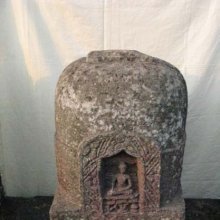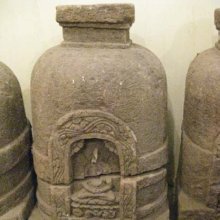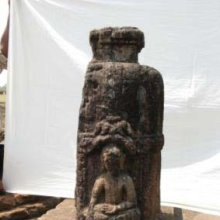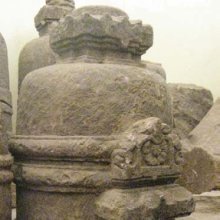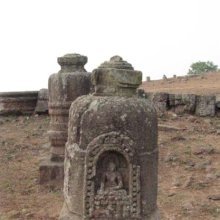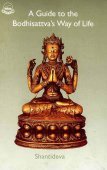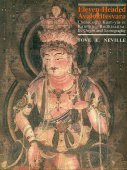Abuddha: 8 definitions
Introduction:
Abuddha means something in Hinduism, Sanskrit, Marathi, Jainism, Prakrit. If you want to know the exact meaning, history, etymology or English translation of this term then check out the descriptions on this page. Add your comment or reference to a book if you want to contribute to this summary article.
Images (photo gallery)
(+30 more images available)
Languages of India and abroad
Marathi-English dictionary
Source: DDSA: The Molesworth Marathi and English Dictionaryabuddha (अबुद्ध).—a S Unknown, not understood.
Source: DDSA: The Aryabhusan school dictionary, Marathi-Englishabuddha (अबुद्ध).—a Unknown, unintelligent, foolish, dull. abuddhi, abudha a Foolish, unwise.
Marathi is an Indo-European language having over 70 million native speakers people in (predominantly) Maharashtra India. Marathi, like many other Indo-Aryan languages, evolved from early forms of Prakrit, which itself is a subset of Sanskrit, one of the most ancient languages of the world.
Sanskrit dictionary
Source: DDSA: The practical Sanskrit-English dictionaryAbuddha (अबुद्ध).—a. Foolish, unwise; अपवादमात्रमबुद्धानाम् (apavādamātramabuddhānām) Sān. S.
-ddhaḥ The individual soul (jīvātmā); अथ बुद्धमथाबुद्धमिमं गुणनिधिं शृणु (atha buddhamathābuddhamimaṃ guṇanidhiṃ śṛṇu) Mahābhārata (Bombay) 12.38.
-ddham 1 Inanimate, lifeless matter (jaḍa); बुद्धयमानं महाप्राज्ञमबुद्धपरिवर्जनात् (buddhayamānaṃ mahāprājñamabuddhaparivarjanāt) Mahābhārata (Bombay) 12.35.31.
2) Ignorance (ajñāna); एवमप्रतिबुद्धत्वादबुद्धमनु- वर्तते (evamapratibuddhatvādabuddhamanu- vartate) Mahābhārata (Bombay) 12.33.1. ind. Inadvertantly; न बुद्धिपूर्वं नाबुद्धं स्मरामीह कदाचन (na buddhipūrvaṃ nābuddhaṃ smarāmīha kadācana) Rām.2.22.8.
Source: Cologne Digital Sanskrit Dictionaries: Monier-Williams Sanskrit-English Dictionary1) Abuddha (अबुद्ध):—[=a-buddha] mfn. unwise, foolish
2) [v.s. ...] not seen or noticed, [???; Rāmāyaṇa]
Source: Cologne Digital Sanskrit Dictionaries: Goldstücker Sanskrit-English DictionaryAbuddha (अबुद्ध):—[tatpurusha compound] m. f. n.
(-ddhaḥ-ddhā-ddham) Not wise, ignorant, foolish; e. g. in the Sāṅkhya Sūtra: apavādamātramabuddhānām. E. a neg. and buddha.
[Sanskrit to German]
Sanskrit, also spelled संस्कृतम् (saṃskṛtam), is an ancient language of India commonly seen as the grandmother of the Indo-European language family (even English!). Closely allied with Prakrit and Pali, Sanskrit is more exhaustive in both grammar and terms and has the most extensive collection of literature in the world, greatly surpassing its sister-languages Greek and Latin.
Prakrit-English dictionary
Source: DDSA: Paia-sadda-mahannavo; a comprehensive Prakrit Hindi dictionaryAbuddha (अबुद्ध) in the Prakrit language is related to the Sanskrit word: Abudha.
Prakrit is an ancient language closely associated with both Pali and Sanskrit. Jain literature is often composed in this language or sub-dialects, such as the Agamas and their commentaries which are written in Ardhamagadhi and Maharashtri Prakrit. The earliest extant texts can be dated to as early as the 4th century BCE although core portions might be older.
See also (Relevant definitions)
Starts with: Abuddhatva.
Ends with (+18): Alpabuddha, Anagatabuddha, Aprabuddha, Atitabuddha, Avabuddha, Dharmatabuddha, Drabuddha, Ghoshabuddha, Gunabuddha, Hatabuddha, Hitashikshaprabuddha, Mahabuddha, Nagabuddha, Nirmanabuddha, Nishcayabuddha, Nishyandabuddha, Pabuddha, Paccekabuddha, Pancabuddha, Panchabuddha.
Full-text (+1534): Bodhisattva, Abuddhatva, Mahabodhi, Abudha, Tathagata, Thuparaha Sutta, Sarvalokadhatupadravodvegapratyuttirna, Kiraka, Sarvadarshin, Gunasagara, Sugata, Munindra, Vishvabhu, Mahasukha, Sambuddha, Rishigupta, Shastri, Lokanatha, Abodha, Catusrimshajjatakajna.
Relevant text
Search found 140 books and stories containing Abuddha, A-buddha; (plurals include: Abuddhas, buddhas). You can also click to the full overview containing English textual excerpts. Below are direct links for the most relevant articles:
Mahabharata (English) (by Kisari Mohan Ganguli)
Bodhisattvacharyavatara (by Andreas Kretschmar)
Text Section 56-61 < [Khenpo Chöga’s Oral Explanations]
Text Section 307 < [Khenpo Chöga’s Oral Explanations]
Text Section 42 < [Khenpo Chöga’s Oral Explanations]
Cidgaganacandrika (study) (by S. Mahalakshmi)
Part 15 - Fifteen states formed by Jāgrat, Svapna, Suṣupti and Turīya < [Philosophy of Kashmir Tantric System]
The Great Chronicle of Buddhas (by Ven. Mingun Sayadaw)
Part 6 - Contemplation on Rare Appearance of a Buddha < [Chapter 2 - Rare Appearance of a Buddha]
Part 8 - Hard to become even a Future Buddha < [Chapter 2 - Rare Appearance of a Buddha]
Part 1 - The story of Setaketu Deva, the future Buddha < [Chapter 1 - The Jewel of the Buddha]
Maha Prajnaparamita Sastra (by Gelongma Karma Migme Chödrön)
V. Value of the Buddha fields < [Part 4 - Assuring the continuity of the Buddha universes]
III. Bodhisattva body and Buddha body < [Part 3 - Possessing a body endowed with the marks]
I. Precise range of this wish < [Part 4 - Assuring the continuity of the Buddha universes]
Related products

